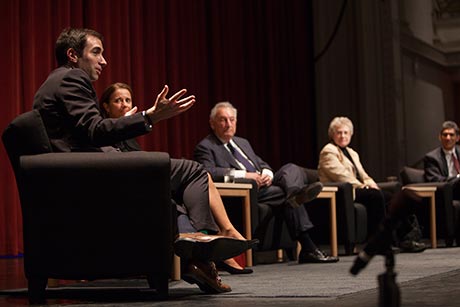Global finance experts ponder safety of financial system
By Anne Ju

An all-alumni panel comprising banking, finance and financial policy experts spent Sunday morning of Charter Day Weekend unpacking the complexities of U.S. financial regulatory reform since the Great Recession of 2007-08. They offered perspective, opinion and advice on how the U.S. can move forward from the fallout of the recession, and how to avoid another one.
Eswar Prasad, the Tolani Senior Professor of Trade Policy at Cornell, led the four panelists through the April 26 discussion in Bailey Hall. They touched on issues from the relative safety of the financial system to ways in which regulatory reform for large banks should be balanced with flexibility for innovation and growth.
“In many ways, things seem a lot more stable, the U.S. economy is doing a lot better, and yet there are concerns about whether things have really been rectified - whether, in fact, finance has become safer,” Prasad said. “Are we really safer in terms of finance today than before the crisis?”
Mary Miller ’77, former undersecretary for domestic finance at the U.S. Department of the Treasury, answered with a “qualified yes.” Miller, who helped orchestrate financial regulatory reforms under the Dodd-Frank Wall Street Reform and Consumer Protection Act of 2010, said there’s “no question” U.S. financial institutions are stronger today than before the crisis. More stringent liquidity and capital requirements, reduced leverage (risk), and required “stress tests” for banks all have made the whole system less prone to failure, she said.
Yet financial activity outside the core banking system – the lending and credit activity that go on in the broader financial landscape – may be areas of concern going forward, she said.
Whether the financial system is safer “depends on your definition of safe,” said Sandy Weill ’55, former CEO and chairman of Citigroup. It goes to the heart of what banks should and shouldn’t be able to do, and Weill argued that the banking system is becoming “inept.”
“Now we have a system where you cannot make a mistake, because if you make a mistake, it not only costs you a lot of money but the government fines you for making a mistake,” Weill said.
Weill said he feels the banking system can be appropriately regulated with relatively simple terms, as opposed to the complexity of the Dodd-Frank legislation. He advocated separating commercial and investment banking to restore confidence and guard against another recession. Investment banking operations, where much of the 2007-08 crisis originated, should be separately regulated with things like leverage ratios and transparency in accounting practices, Weill said.
Changes in bank regulations have been good in some regards, said Abby Joseph Cohen ’73, senior U.S. investment strategist at Goldman Sachs. There has been a “dramatic increase in confidence” since the worst of the financial crisis, and the beginning of that rise was marked by the first government-mandated stress tests for banks in 2009.
Cohen expressed concern, as did Weill, about banks’ new capital requirements that do not let them lend as much as they used to. “Many macroeconomists believe if there isn’t enough lending, there isn’t much economic growth,” Cohen said.
“You can be super safe and lock up all the liquidity, or be unsafe and lend it out and use it for lots of things,” she said. “We need to find a happy medium, and I’m not sure we’re there yet.”
Prasad posed whether the new safeguards and regulations for big banks mean they aren’t the problem anymore.
Andrew Ross Sorkin ’99, founder and editor of The New York Times’ Dealbook section and a Times financial columnist, said due to regulatory reforms, he can’t foresee a moment in the next five years in which large investment or commercial banks “fall over like dominoes” as a result of risk-taking. “Could they fall for other reasons? Maybe, but they would fall over because of risk that will have developed in some other part of the business.”
Take, for example, a large company like the global investment firm Blackstone, Sorkin said. It owns huge swaths of real estate, but it is not regulated like the large banks.
If another crisis develops, it will be about other issues like unemployment, Sorkin said.
Cohen concluded with calling Cornell Tech and Weill Cornell Medical College in New York City shining examples of how Cornell is creating jobs and economic prosperity in growth industries.
Media Contact
Get Cornell news delivered right to your inbox.
Subscribe